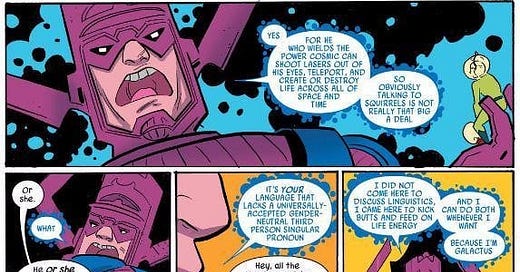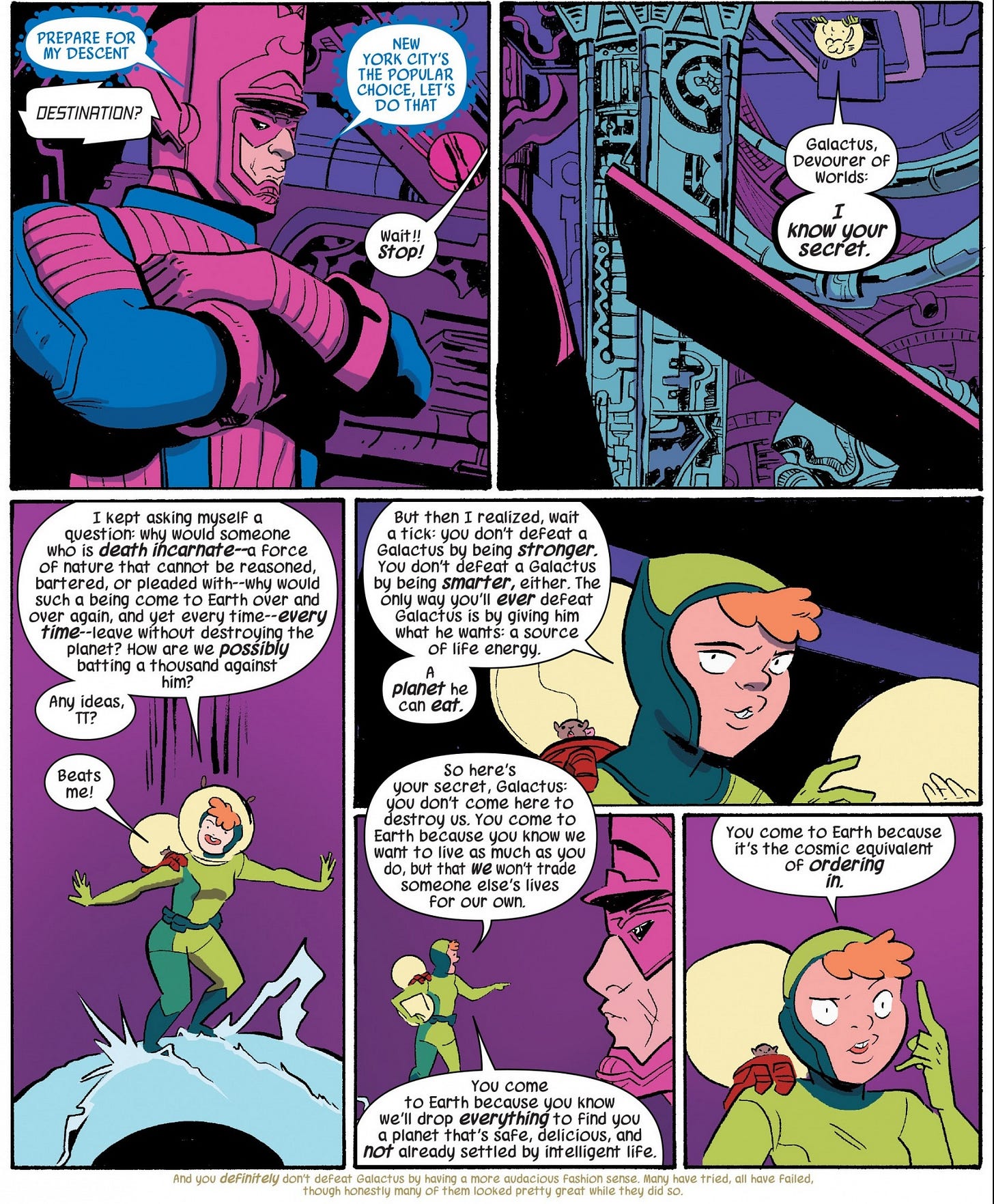#241 - Standing Up to False Gods
They think they have all the power (until you prove otherwise).
This week we’re looking at some examples of conflicts between a mere mortal and an overpowered, overconfident foe. Specifically, characters so much larger than life, that they see themselves at the level of gods.
It’s not an easy fight to win, so how do some characters pull it off? What can we learn from them about writing moments where an underestimated underdog wins the day?
Squirrel Girl’s arms are too short to box Galactus
Galactus eats planets, and in The Unbeatable Squirrel Girl #4, the only one who knows he’s about to eat Earth is Doreen “Squirrel Girl” Green.
Galactus is an immense being, wielding astonishing powers, and has a single-minded focus when he’s hungry. Squirrel Girl is a mutant hero with the proportional speed and strength of a squirrel, the ability to talk with squirrels, and a quick wit.
And that last one is key:
Squirrel Girl knows that beating Galactus isn’t the same as beating him up. So she looks to his goals. What does he want? How does he intend to get it?
Not only does she find another planet for Galactus to eat, but she develops a theory for why Galactus always shows up to eat Earth, but always leaves hungry. It’s a strategy that surprises, undercuts, and pivots. Doreen deflates Galactus’s ego just a little so he’s off-balance when she offers an alternative solution to his problem.
Truman meets his creator
The major confrontation in The Truman Show starts with a dual surprise: Truman manages to hide from the cameras surrounding him in the city-sized sound stage he’s lived for his whole life, and he uses this opportunity to get in a sailboat to escape his home.
The second part is especially a surprise to Kristof, the shows creator and director, who sees Truman as someone pliable and controllable. He never questions his power over Truman.
Kristof built the entire town and cast around Truman, who hasn’t seriously questioned his reality for most of his life.
Kristof has created impromptu scenarios to misdirect Truman if he starts to get too close to the truth.
Kristof has plans that go years into the future, safe in his belief that he oversees everything and directs everyone.
Most importantly in these final moments, Kristof engineered Truman’s fear of boats and the ocean by staging the “death” of his father in a boating accident when Truman was a child (and reinforcing this fear any time it seemed necessary).
Truman in a boat, sailing toward freedom, undercuts Kristof’s entire understanding of who holds the power between them. So he starts with a god-like tool and generates a thunderstorm to try and scare Truman into turning back.
But it doesn’t work. Truman holds tight and makes it to the edge of the soundstage, where he finally gets to “meet” his maker:
This confrontation puts them on uneven footing from the jump. Kristof speaks to Truman over a loudspeaker from his studio in the “moon.” He makes it look like his voice comes from a light shining down through the clouds. He even identifies himself as “The creator (of a television show)”
But Truman pivots the conversation away from Kristof’s talking points. Kristof wants Truman to think about the viewers, and to think about how Truman will be kept safe if he stays inside the world of the show. But Truman asks, “Was nothing real?” It moves the conversation from being about safety and impact to an argument about authenticity and control.
Kristof asserts his omnipotence by reminding Truman that he’s watched him for his whole life. “I know you better than you know yourself.” And Truman’s reaction focuses on undercutting this god-like power “You never had a camera in my head!”
At this point, the fight is all over except for the crying. Truman’s victory is asserting that he has thoughts independent of the story that’s been crafted for him. He pivots their dynamic with one final touch, using a line he had been conditioned to use as a catch phrase as his kiss off to Kristof.
Margot orders off The Menu
The Menu sets up Chef Slowik as a cult leader, with a kitchen staff that snaps to his attention at a clap and always responds in a full-throated “Yes, Chef!” when he requires it. All of this is in service to an expensive and exclusive tasting menu made from ingredients harvested on the restaurant’s island.
Chef Slowik doesn’t just have control in the kitchen, but he has power over life and death. He introduces his menu reminding people about the way that life and death plays into what we eat. But it goes further than that. He has one of his chefs commit suicide after introducing a course. He murders an investor in his restaurant. His plan for the final course of the evening involves the death of all his customers, his staff, and himself. It’s his revenge for the people who have reduced cooking to an aesthetic exercise, and his penance for being willingly complicit in that machine.
And he comes very close to pulling it all off exactly as planned, if it wasn’t for Margot.
Margot sees an old photo of Chef Slowik working at a diner, making cheeseburgers. And in a moment of desperation, she weaponizes that knowledge. She surprises the kitchen staff and other diners by simulating the Chef’s clap and silencing the restaurant. She undercuts Slowik’s greatness by calling out his food as cold, unfeeling, and not particularly filling. She says she’s hungry for real food, not a conceptual art piece.
And here comes the pivot: She orders a cheeseburger, again undercutting his powers by saying she doesn’t believe he could make a real, honest cheeseburger. What follows is the most joyful and passionate moment for Chef Slowik in the entire film. He lovingly crafts her a double-cheeseburger and fries, reminded of a time when cooking was a joy.
He watches her take a bite, the first moment in the film where he truly pays attention to a customer eating with any interest. Margot smiles, and then makes one more request: Can she take the rest to go?
Much like Squirrel Girl getting a read on Galactus, Margot found a way to provide Chef Slowik a moment he desperately craved: An authentic moment of cooking for someone who was hungry. And in return for the gift of this moment, Chef Slowik wraps her meal and lets her leave, allowing her to escape death.
What can we use?
No false god is inscrutable: They all have motivations that can be understood and played into. Understanding their “Why” is crucial to finding a strategy.
The Emperor is Shirtless: Their power isn’t all deception, but it isn’t as complete as they believe. There are weak points to be found.
Be Unpredictable: God-like characters are often planners, and they don’t always know how to deal with a pantser. Breaking their rules diminishes their power and confidence, leaving them open to manipulation and defeat.
👋 Are you new here?
Inneresting is a weekly newsletter about writing and things that are interesting to writers. Subscribe now to get more Inneresting things sent to your inbox.
Previously on Inneresting…
In case you missed it, in last issue’s most clicked link, you’ll see an adjective and two different pictures of chickens. Then you click on the chicken you think best represents that adjective. Keep doing this until you feel emotionally leveled out.
What else is inneresting?
Craig Mod on the aversion to carrying trash with you, and our relationship to the refuse we create.
Ryan Chapman puts forward Wonder Boys as the best onscreen depiction of a writer ever.
Scott Horsley on why Canada has more eggs than the United States right now.1
And that’s what’s inneresting this week!
Inneresting is edited by Chris Csont, with contributions from readers like you and the entire Quote-Unquote team.
Are you enjoying this newsletter?
📧 Forward it to a friend and suggest they check it out.
🔗 Share a link to this post on social media.
🗣 Have ideas for future topics (or just want to say hello)? Reach out to Chris via email at inneresting@johnaugust.com, Bluesky @ccsont.bsky.social, or Mastodon @ccsont@mastodon.art.
Post-Credits Scene
If that scene from The Menu left you craving that burger, here’s how to make it to Chef’s standards.
Editor’s Note: I promise you that between this and last week’s most clicked link, I am not slowly transforming this into a chicken-focused newsletter. 🐣





